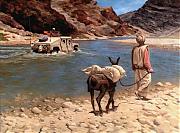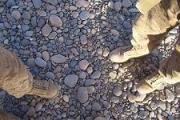Thought this might interest you.
Admiral Fallon and CENTCOM (Page 9)
American Thinker; Douglas Hanson
When it was announced by the President last week that Navy Admiral William J. Fallon, current commander of Pacific Command (PACOM), will replace Central Command (CENTCOM) boss Army Gen. John P. Abizaid, the reaction was nearly universal: why a Navy man to lead what are predominately Army and Marine forces in the Central Region? The blogs and the New York Times suggested that if we are to deal with Iran, we need a commander who has experience with naval forces and airpower.
While that is certainly a factor in his favor, the real reason for his selection as I see it is much simpler: PACOM has been showing steady progress towards victory in the War on Terror, while CENTCOM has not.
The key reason for CENTCOM's inability to prosecute the war in full is that it has been hamstrung by its own inherent weaknesses. The command was established based on the desire for both civilian and military leaders of the time to show the world that we "were doing something" to defend the oil-rich Central Region. What resulted was a major warfighting command that was an artificial construct, dependent on the good graces of oil oligarchs for its ability to even minimally function as an effective force in the area.
The command was an outgrowth of the Rapid Deployment Joint Task Force (RDJTF), which was hastily thrown together by the Carter administration. The RDJTF concept was to use light, airborne forces to rapidly deploy to secure terrain (likely in open desert - not exactly the first choice of paratroopers) for follow-on forces, and with the aid of massive amounts of airpower, hold out until stateside heavy forces could arrive to save the day. It was an extremely risky plan and was logistically unsupportable especially in the era of Carter's hollow military.
In 1983, USCENTCOM was formally established and was assigned the most volatile territory on the planet. The key word is assigned. Unlike EUCOM and PACOM, CENTCOM was neither descended from a victorious WW II supreme headquarters nor did it command forces which had actually conquered its home-base territory. From the very beginning, CENTCOM was expected to launch major combat operations from ground that was under control of "allies" of dubious and ever-changing loyalties.
Since there were no large combat formations permanently stationed in CENTCOM's area *, circumstances and the ill will of Islamic fanatics could potentially force the commander and the US into two choices if a major war with the USSR erupted: mount a massive forcible entry operation or attempt to cordon off the crisis area and hope for the best. After all, what could have been realistically expected given that the command had been invented out of whole cloth and its sphere consisted of the most radicalized nations in the world?
Just as important in CENTCOM's string of incomplete victories and stalemates is the history of the command's leaders who had to rely on so-called "engagement" exercises with the rulers of the area, in some cases out of necessity. But to whom much is given in stationing rights and intelligence, much is expected in return, especially in deference to regional issues important to those same extremist rulers.
There were, and are strong incentives for a few former CENTCOM leaders to criticize GW and the Iraq War, and to reflect the anti-Israel stance and subtle anti-Semitic complaints of our supposed "partners" in the Global War on Terror. Even the previous CENTCOM commander, who prosecuted one of the most successful offensives in modern history, couldn't resist expounding on the necessity of solving the Palestinian-Israeli conflict as the most important task to promote regional peace. Meanwhile, fighting Sunni Baathists seemed to take second place in the aftermath of Operation Iraqi Freedom.
The continual carping on the Palestinian- Israeli conflict not only distracted from the fight against Saddam's irregulars and Syrian and Iranian operations in the Central Region, but put undue pressure on the western cornerstone of our global strategy in the war against Axis of Evil nations. For this reason, Israel should definitely remain under EUCOM's umbrella, free from what passes for strategic thinking in CENTCOM headquarters.
It's clear that decades-old political and military restrictions and downright wishful thinking have resulted in a command that seems to have trouble grasping the larger regional fight, even taking into account the recent operations in Somalia, which frankly, have been long overdue. Neither the President nor the new SecDef can rearrange global geographic responsibilities in the middle of a war, but they can reinvigorate the command by shaking up the leadership and showing their radical sponsors that business as usual is now over.
This is where Admiral Fallon comes in.
Acting without the restraints imposed by nominal allies, Admiral Fallon and PACOM have been closing the gate on Iran from the east **. India's strategic partnership with the US should be recognized as PACOM's singular achievement to date in the War on Terror. By the use of solid statesmanship, military exchanges and defense cooperation, the US has taken away the largest potential market for Persia's vast energy resources. Not only that, but a sea change of geo-political alignments has taken place that will be effective in countering any new alliances composed of both old and new enemies with access to Central Asia and the Pacific Rim.
This is only the most visible example of PACOM's successes. Steady progress has also been made on the direct action front against terror groups such as Abu Sayyaf in the Philippines, where it was reported last month that Filipino forces had killed the group's leader, Khadaffy Janjalani, in a firefight in September. US Special Forces advisors, and civilian support to Filipino law enforcement agencies and the court system are gradually paying off.
In short, Admiral Fallon has been masterful in executing both our long-range strategic goals and in conducting the close fight by rolling up terror groups in the Pacific.
Whether the Coalition does in fact, embark on extensive naval and air campaigns against Iran or another rogue state is a matter of conjecture. We can be reasonably sure however, that Admiral Fallon will bring a singular focus and vision to achieving victory in the Central Region, free of CENTCOM's institutional inertia and bias.
* In contrast, PACOM has roughly 100,000 US troops permanently stationed within the command's area, with the ability to quickly reinforce with another 200,000.
** EUCOM has been tightening the noose around Iran from the north and west by establishing political and military ties with the Republic of Georgia and Azerbaijan. Also, a major realignment of US forces in Europe will place training and deployment bases in the Black Sea countries of Bulgaria and Rumania to support units on six-month forward deployments to Southeastern Europe.
Douglas Hanson is the national security correspondent for American Thinker
http://www.americanthinker.com/2007/...d_centcom.html







Bookmarks